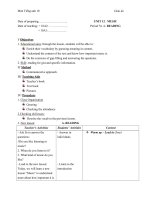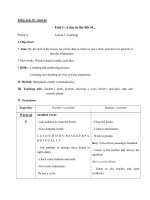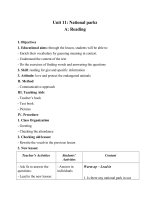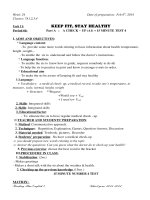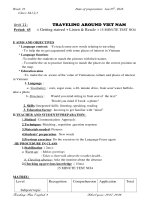Giáo án Tiếng Anh 10 unit 11 National parks
Bạn đang xem bản rút gọn của tài liệu. Xem và tải ngay bản đầy đủ của tài liệu tại đây (265.86 KB, 15 trang )
Môn Tiếng anh lớp 10 – Giáo án.
Date of preparing:………………………
Date of teaching: + 10A2: ……………….
+ 10A1:……………….
UNIT 11
NATIONAL PARKS
Period 66: A. READING
I/ Objectives
1. Educational aims: through the lesson, students will be able to:
Enrich their vocabulary by guessing meaning in context.
Understand the content of the text.
Do the exercises of finding words and answering the questions.
2. Skill: reading for gist and specific information
3. Attitude: love and protect the endangered animals.
II/ Method
Communicative approach.
III/ Teaching Aids
Teacher’s book
Text book
Pictures
IV/ Procedure
1. Class Organization
Greeting.
Checking the attendance.
2.Checking old lesson:
Rewrite the vocab in the previous lesson.
3. New lesson: A. READING
Teacher’s Activities Students’ Activities Content
- Ask Ss to answer the
questions:
- Lead to the new lesson:
Today, we will learn a new
lesson “ National Parks” to
understand more about some
national parks in the world.
- Answer in
individuals.
- Listen to the
introduction.
Warm up – Lead in (5ms)
1. Is there any national park in our province?
2. Have you ever visited it?
ACTIVITY 1 : BEFORE YOU READ (6 ms)
- Ask Ss to read the questions,
work in pairs and answer the
questions.
- Call on some pairs to give
answers.
- Correct the answers.
- Ask and answer
the questions in
pairs.
- Give answers.
- Listen carefully.
1. Answer the questions
ACTIVITY 2 : WHILE YOU READ(25 ms)
- Give some pictures about
some national parks and ask Ss
to look at the pictures and
answer the teacher’s
questions.
- Ask Ss to listen to the tape
and underline new words.
- Give and explain some new
words.
- Read words and ask Ss to
repeat.
- Ask Ss to read the passage,
get information, and prepare
for Tasks.
- Ask Ss to explain the
requirement.
- Ask Ss to workindependently
to do task 1 in 2 ms.
- Have Ss compare the answers
with a friend.
- Call Ss to give answers and
explain.
- Feedback and give the correct
answers.
-Read words and ask Ss to
repeat.
- Ask Ss to explain the
requirement of Task 2.
- Ask Ss to read the questions
first, underline the key words.
- Explain the new words if any.
- Ask Ss to work in pairs, read
the passage again and find the
answers.
- Look at the
pictures and answer
the questions.
-Listen to the tape
and underline new
words.
- Listen to the
teacher and repeat
after teacher’s
reading.
- Read silently
- Explain the
requirement
- Work individually
and do the task.
- Compare the
answers with a
friend.
- Read aloud their
words in front of
the class and
explain.
- repeat
- Explain the
requirement.
- Read questions,
underline the key
words.
- Work in pairs,
read the passage
and answer.
1. New words and phrases
- to be located in/ at
- variety (n) / və'raiəti/ sự đa dạng
- recognise (v) / 'rekəgnaiz / nhận ra
- Orphanage (n) / 'ɔ:fənidʒ/ trại mồ côi
- abandoned (a) / ə'bændənd / bị bỏ rơi
- take care of
- temperate (a) / 'tempərət / ôn đới
2. Tasks
Task 1 : Find the word in the
passage that best suits each of the
definition
* Suggested answers
1. establish
2. contain
3. species
4. survival
5. sub-tropical
6. contamination
Task 2 : Answer the questions
* Suggested answers :
1. Over 200 square km.
2. Because the rainy is over.
3. They can learn about the habits of animals
and how one species is dependent upon
another for survival.
4. In the orphanage, orphaned and abandoned
animals are taken care of.
5. Everglades national park is endangered
- Ask Ss to compare the
answer with other pairs.
- Call some pairs to ask and
answer in front of the class.
- Feedback and give correct
answers.
- Compare the
answers.
- Answer in front of
the class.
- Explain
because of the toxic levels of chemicals in
water.
6. If so, plants and animals will die.
ACTIVITY 3 : AFTER YOU READ (5 ms)
- Ask Ss to work in groups,
answer the question.
- Go round and provide help.
- Call some Ss to answer in
front of the class.
- Feedback.
- Work in groups.
- Answer in front of
the class.
Discuss in groups
4. Consolidation, homework (2ms)
- Summarize the main contents of the lesson.
- Learn by heart words.
- Prepare next part, part B: Speaking.
5. Drawing experience:
…………………………………………………………………………………………………
…………………………………………………………………………………………………
…………………………………………………………………………………………………
******************************************************************************
Date of preparing:………………………
Date of teaching: + 10A2: ……………….
+ 10A1:……………….
UNIT 11
NATIONAL PARKS
Period 67: A. SPEAKING
I/ Objectives
1. Educational aims: by the end of the lesson, students will be able to:
Talk about an excursion.
Express the regrets.
2. Skill: expressing information and speaking for details.
3. Attitude: love and protect the endangered animals.
II/ Method
Communicative approach.
III/ Teaching Aids
Teacher’s book
Text book
Pictures
IV/ Procedure
1. Class Organization
Greeting
Checking the attendance
2.Checking old lesson:
Rewrite the vocab in the previous lesson
3. New lesson: B. SPEAKING
Teacher’s Activities Students’ Activities Content
- Ask Ss to answer some
questions.
- Gather ideas and lead in.
- Answer
individually
- Listen to the
introduction
Warm up – Lead in (5ms)
1. If you are going on a trip, what will you
prepare for the trip?
2. If you don’t prepare well, what will happen?
ACTIVITY 1 : PRE – SPEAKING
- Read the requirement and
ask Ss to explain the
requirement.
- Read the columns and
explain some new words.
- Ask Ss to work in pairs, read
the columns carefully and
match the things and the
consequences.
- Call some pairs to answer.
- Feedback
- Explain the
requirement.
- Listen to and
write down.
- Work in pairs,
read the columns
and match.
- Answer in front of
the class.
Task 1: Matching
- Food poisoning
- fine (n)
- get lost
* Suggested answers :
1 f 5 b
2 c 6 c
3 h 7 a
4 g 8. -d
ACTIVITY 2 : WHILE – SPEAKING
- Ask Ss to explain the
requirement.
- Instruct: You are Nga’s
classmates and you are not
happy with the excursion.
Now, you are talking with
some other friends about what
you wish you had or had not
done.
- Explain the structure of
Conditional sentence Type III
- Ask Ss to work in groups to
do the task.
- Go round to observe and
offer helps.
- Call on some representatives
of groups to talk about their
ideas.
- Comment and correct the
- Listen to the
instruction
- Notice and write
down
- Work in groups
and do the task
- talk about their
ideas
Task 2:
Showing regrets
* Conditional Sentence Type III
- Form: If + S + had + V3/ V- ed , S + would +
have + V3/ V-ed
- Meaning: unreal condition in the past
* Suggested answers
A: I hear they didn’t bring enough food so they
had to spend a lot of money on expensive
restaurants.
B: If they had brought enough food they
wouldn’t have spent a lot of money on
expensive restaurants.
A: I heard some had food poisoning so that
couldn’t enjoy their visit.
B: If some hadn’t had food poisoning they
could have enjoyed their visit.
A: I heard they had no raincoat so they got wet
and some had a cold.
B: If they had had raincoat so they wouldn’t
answers.
- Explain the requirement or
instruct:
- Ask Ss to work in pairs to
express the regrets.
- Help Ss by giving
questions.
- Listen to the
instruction.
- Work in pairs to
do Task 3.
- Notice the
questions.
have got wet and some wouldn’t have had a
cold.
Task 3: Expressing the regrets
ACTIVITY 3 : POST – SPEAKING
- Ask Ss to prepare to report.
- Call on some Ss to report.
- Comment and give marks.
- Prepare to report.
- Report in front of
the class.
4. Consolidation, homework (2ms)
- Summarize the main contents of the lesson.
- Learn by heart words.
- Prepare next part, part C: Listening.
5. Drawing experience:
…………………………………………………………………………………………………
…………………………………………………………………………………………………
…………………………………………………………………………………………………
******************************************************************************
***
I/ Objectives
1. Educational aims: through the lesson, students will be able to:
listen to get specific information about Cuc Phuong National Park.
talk about the features of Cuc Phuong National Park.
2. Skill: listening for specific information.
II/ Method
Communicative approach.
III/ Teaching Aids
Teacher’s book
Text book
Cassette player and tape
IV/ Procedure
1. Class Organization
Greeting
Date of preparing:………………………
Date of teaching: + 10A2: ……………….
+ 10A1:……………….
UNIT 11
NATIONAL PARKS
Period 68: C. LISTENING
Checking the attendance
2.Checking old lesson:
Rewrite the vocab in the previous lesson.
3. New lesson: C. LISTENING
Teacher’s Activities Students’ Activities Content
- Ask Ss to look at the picture
and answer some questions:
1. Do you know where it is?
2. Have you ever visited it?
3. What do you know about it?
- Introduce new lesson: Today,
we’ll listen to the tape to get
some information about Cuc
Phuong National Park.
- Listen to the
questions, think and
answer
individually.
- Listen to the
introduction.
Warm up – Lead in (5ms)
ACTIVITY 1 : BEFORE YOU LISTEN(8 ms)
- Ask Ss to work in groups, ask
and answer the questions.
- Call some Ss to ask and
answer.
- Pre-teach some words related
to the listening part.
- Read aloud words and ask Ss
to repeat.
- Ask and answer
the questions in
groups
- Ask and answer
- Notice and write
down.
- Listen and repeat
Work in groups : ask and answer the
questions
1. It is in the southwest of Hanoi.
2. It contains over 200 square km of
rainforest.
3. It is during the dry season.
4. Butterflies, caves, mountains and 100-
year-old trees can be seen there.
Listen and repeat
- threatened and endangered species
- flora (n)
- attack (v)
- ethnic minority (n)
- fauna (n)
- enemy (n)
ACTIVITY 2 : WHILE YOU LISTEN (24 ms)
- Introduce: You will hear a
passage about Cuc Phuong
National Park. Listen and do
the tasks.
- Ask Ss to explain the
requirement of Task 1.
- Ask Ss to read the statements
and be sure that all the students
understand them.
- Play the tape and ask Ss to
listen and do the task.
- Listen to the
introduction.
- Explain the
requirement.
- Read the
statements.
- Listen to the tape
and do the task.
Task 1 : Events Ordering
* Suggested answers
1. Cuc Phuong National Park was officially
opened in 1960.
2. Cuc Phuong is located 160 km southwest
of Hanoi.
3. In 2002, nearly 100.000 visitors visited
- Ask Ss to discuss with
friends about the answers.
- Call some Ss to give their
answers.
- Play the tape again and ask
Ss to check their answers.
- Correct
- Instruct Ss: you will listen to
the tape again and answer the
questions.
- Ask Ss to read the questions
carefully.
- Ask Ss to try to answer the
questions before listening
- Play the tape and ask Ss to
listen and answer.
- Ask Ss to compare the
answers with a friend.
- Call some Ss to read aloud
their answers and explain.
- Play the tape again and give
correct answers.
- Discuss in pairs.
- Give answers
- Listen again and
check.
- Listen to the
instruction.
- Read
the questions
carefully.
- Try to answer
- Listen to the tape
and answer.
- Compare the
answers with a
friend.
- Give the answers.
- Listen again and
check.
Cuc Phuong.
4. There are about 2000 different species of
flora and 450 species of fauna.
5. Nguyen Hue’s army was stationed in Quen
Voi before it made its surprise attack on
Thang Long.
Task 2 : Answer the questions
* Suggested answers
1. It covers 3 provinces: Ninh Binh, Hoa
Binh and Thanh Hoa.
2. It is about 160 km.
3. They come there to see the work
being done to protect endangered species.
4. Nguyen Hue defeated the Qing
invaders in the spring of 1789.
5. They live mainly on bee keeping and
farming.
ACTIVITY 3 : AFTER YOU LISTEN(5 ms)
- Ask Ss to work in groups.
- Call some Ss to present in
front of the class.
- Work in groups.
- Present in front of
the class.
Work in groups: talk about the
species features of Cuc Phuong
national Park.
4. Consolidation, homework (2ms)
- Summarize the main contents of the lesson.
- Learn by heart words.
- Prepare next part, part D: Writing
5. Drawing experience:
…………………………………………………………………………………………………
…………………………………………………………………………………………………
…………………………………………………………………………………………………
******************************************************************************
I/ Objectives
1. Educational aims: through the lesson, students will be able to:
Know how to accept or refuse an invitation.
Write a letter of acceptance or refusal.
2. Skill: Writing for gist and specific information.
II/ Method
Communicative approach.
III/ Teaching Aids
Teacher’s book
Text book
IV/ Procedure
1. Class Organization
Greeting
Checking the attendance
2.Checking old lesson:
Rewrite the vocab in the previous lesson.
3. New lesson: D. WRITING: A LETTER OF ACCEPTANCE OR
REFUSAL
Teacher’s Activities Students’ Activities Content
- Give a situation and ask Ss to
answer
Someone invites you to go out
for dinner. If you agree to go,
what will you say? If you
refuse /don’t agree, what will
you say?
- Call some Ss to answer.
- Introduce new lesson: Today,
we will learn to write a letter to
accept or refuse an invitation.
- Listen to the
situation and
answer.
- Answer the
questions.
- Listen to the
introduction.
Warm up – Lead in (5ms)
Would you like to go out for dinner this
evening.?
- Yes, I’d love to
- I’d love to but this evening I am busy…
ACTIVITY 1 : PREPARATION AND PRESENTATION (10 ms )
Date of preparing:………………………
Date of teaching: + 10A2: ……………….
+ 10A1:……………….
UNIT 11
NATIONAL PARKS
Period 69: D. WRITING
- Introduce: when you agree to
accept an invitation, you often
use the ways of accepting. Or
when you refuse an invitation.
You use the ways of refusing.
- Ask Ss to explain the
requirement.
- Read the letters and ask Ss to
work in individual to complete
it. First, ask them to decide
whether it is a letter of
acceptance or refusal. Then,
find the suitable expression to
complete it.
- Ask Ss to compare the
answer with a friend.
- Call on some Ss to give
answer (by reading the whole
letter)
- Read the completed letters
again and check.
- Listen to the
teacher and then
write down on the
notebook.
- Explain the
requirement.
- Work in
individual, decide
and complete.
- Compare
- Answer
- Notice
Task 1 : Complete the letters
* Ways of accepting
- Yes, I’d like/ love to…
- Yes, that’s a great idea
- Yes, I am happy to come.
- Yes, I really like to come.
- I’d be delighted to…
* Ways of refusing
- I’d like /love to but I can’t come because …
- I’m afraid I can’t …because….
- I’m sorry I can’t because…
* Suggested answers
1. Dear Chi,
Something is wrong with my phone, so I am
leaving you this note. Thanks for your
invitation. I’d like to ( I’d love to) How
about meting at the school gate at 8: 30?
Lien
2. Dear David,
Thanks for your note. I’m sorry I can’t
because ( I’d love to but…)my father has
been ill since yesterday and I have to look
after him.
Let’s go another time.
3. Dear Daisy and Tony,
Thanks very much for your invitation to
dinner. Of course, I’d be delighted to.
I’m sure we will have a good time together.
Susan.
ACTIVITY 2 : PRACTICE (18 ms)
- Ask Ss to explain the
requirement.
- Ask Ss to work in individual,
read the sentences carefully
and rearrange them to
complete the letter.
- Ask Ss to share the answer
with a friend.
- Call some Ss to read their
letters.
- Correct
- Explain the
requirement
- Work in
individual and
arrange the
sentences to
complete the letters.
- Exchange the
answer.
- Read the letters.
Task 2 : Letter completion
* Suggested answers
Dear Nam,
1 d
Thank you for your letter.
2 e
It’s lovely to hear that you are going to
spend the next weekend in the country.
3 c
I would really like to come.
4 a
You know how much I love spending a
weekend in the country after a long and hard
term.
- Explain the requirement
- Remind Ss that they should
use the suitable tenses and
language items.
- Ask Ss to write individually
- Ask Ss to exchange their
letters.
- Listen carefully
- Notice and
remember.
- Write letter
- Exchange the
writings.
5 f
I will catch the usual train on Friday evening
6 b
Give my best regards to your parents and
hope to see you soon.
Task 3 : Writing a letter
ACTIVITY 3 : PRODUCTION (10 ms)
- Call on 2 Ss to go to the
board and write down the
letters.
- Check and correct the
mistakes.
- Write down the
letters on the board.
* Suggested answers
Dear Phuong,
Thank you for inviting me to join your picnic
to Cuc Phuong National Park, I’d like to but
I can not because I’m very busy reviewing
my lessons for the English test.
Let’s go another time.
Love,
Minh.
4. Consolidation, homework (2ms)
- Summarize the main contents of the lesson.
- Learn by heart words.
- Prepare next part, part E: Language Focus.
5. Drawing experience:
…………………………………………………………………………………………………
…………………………………………………………………………………………………
…………………………………………………………………………………………………
******************************************************************************
I/ Objectives
1. Educational aims: through the lesson, students will be able to:
Distinguish and pronounce the sounds / t / and / d/ correctly.
Understand the usage of conditional sentence type 3.
II/ Method
Communicative approach.
III/ Teaching Aids
Teacher’s book
Text book
Date of preparing:………………………
Date of teaching: + 10A2: ……………….
+ 10A1:……………….
UNIT 11
NATIONAL PARKS
Period 70: E. LANGUAGE FOCUS
Cassette player, tape
IV/ Procedure
1. Class Organization
Greeting
Checking the attendance.
2.Checking old lesson:
Rewrite the vocab in the previous lesson.
3. New lesson: E. LANGUAGE FOCUS
Teacher’s Activities Students’ Activities Content
ACTIVITY 1: PRONUNCIATION (10 ms )
- Give words included sounds,
read aloud these words,
pronounce these sounds
clearly and slowly.
- Call Ss to read words and
help them to distinguish them
- Instruct the way to pronounce
- Play the tape and ask Ss to
repeat words.
- Call some Ss to read sounds
clearly.
- Play the tape.
- Ask Ss to underline words
included sounds in sentences.
- Call some Ss to read
sentences.
- Correct
- Listen carefully
- Read words
clearly
- Notice
- Listen and repeat
words
- Read sounds
- Listen
- Listen and
underline words
- Read aloud
sentence by
sentence
Introduce sounds and ways to
distinguish them
- / t/:
Ex: tear, topic, toxic, hoped, worked
- / d/
Ex: die, damage, different, played, lived
Notes:
- Verbs ended with voiceless sounds ( p, k,
f, s, h, θ, t∫, ∫ ) , except t, ed was read / t/
- Verbs ended with voiced sounds ( b, g, v,
z, m, n, l, r, j, w, dʒ, ʒ, đ ) and vowels,
except d, ed was read / d/
Practice
ACTIVITY 2 : GRAMMAR AND VOCABULARY (30 ms)
- Give examples.
- Ask Ss to analyse the
examples.
- Give the meaning, form and
use of conditional sentence
type 3.
- Notice
- Analyse
- Write down
I/ Conditional sentence type 3
Ex: -I didn’t come to her party. I didn’t meet
Jim.
If I had come to her party, I would have
met Jim
Form:
If clause , main clause
If + S + had + PP, S+ would + have + PP
Usage : express an unreal condition in the
past
* Notes :
- Unless = if … not
- We can omit If in case of reversing the verb
and subject of if clause
Ex: had I known she was in hospital, I would
have visited her
Practice
- Ask Ss to work individually
and give the right form of the
verbs in brackets.
- Ask Ss to compare the
answers with a friend.
- Call some Ss to give their
answers.
- Feedback and give correct
answers.
- Instruct
- Ask Ss to do Task 2
- Call some Ss to write down
their sentences on the bb.
- Feedback and give correct
answers.
- Instruct
- Ask Ss to work individually
to do Exercise 3.
- Ask Ss to exchange in pairs
- Call on some Ss to write
down their sentences on the
BB.
- Correct
- Work in
individual, do
exercise 1 as the
requirement.
- Compare the
answers with
friend.
- Give the answers
- Notice
- Listen to the
instruction
- Do task 2
- Write down
- Listen to the
instruction
- Do as requirement
- Exchange
in pairs
- Write down
Exercise 1: Choose the right form of verb
* Suggested answers
1. had known
2. had had
3. would have gone
4. would have passed
5. would have enjoyed
6. had known
7. had stopped
8. had called
Exercise 2: Write a sentence with If for
each situation
* Suggested answers
1. If the driver in front hadn’t stopped
so suddenly, the accident wouldn’t
have happened.
2. If I had known that Lam had to get up
early, I would have woken him.
3. If Hoa hadn’t lent me the money, I
wouldn’t have been able to buy a car
only.
4. If Mary hadn’t been wearing a seat
belt, she would be injured in the
crash.
5. If you had had breakfast, you would
not be hungry now.
6. If I had had some money on me, I
would have got a taxi.
Exercise 3: use the given information to
make conditional sentence with If
* Suggested answers
1. If I
had
been working at the restaurant
last night, I
would
have waited on your
table.
2. If they had been paying attention,
they would have seen the sign
marking their exit from the highway.
3. Carol would have answered the
phone if she hadn't been studying.
4. If the sun hadn't been shining, we
wouldn't have gone to the beach
yesterday.
5. If the music hadn't been playing
loudly at the restaurant, I would have
heard everything Mr Lee said during
the dinner.
4. Consolidation, homework (2ms)
- Summarize the main contents of the lesson
- Learn by heart words
- Prepare next part, part E: Language Focus
5. Drawing experience:
…………………………………………………………………………………………………
…………………………………………………………………………………………………
…………………………………………………………………………………………………
*********************************************
I/ Objectives
1. Educational aims: through the lesson, help Ss to:
Listen to the passage and answer the questions
Read the passage and do the True/ false exercise and find the words in the text
Give the correct verb form
Write a letter of invitation
2. Skill: reading, listening and writing for gist and for specific information
II/ Method
Communicative approach
III/ Teaching Aids
Teacher’s book
Text book
Cassette player, tape
IV/ Procedure
1. Class Organization
Greeting
Checking the attendance
2. New lesson:
Teacher’s Activities Students’ Activities Content
ACTIVITY 1: LISTENING (10 ms )
- Explain the requirement
- Ask Ss to read the questions
and underline the key words.
Make sure that all the students
understand the questions
- Play the tape and ask Ss to
listen and answer the questions
- Ask Ss to discuss the answers
with a friend
- Listen to the
explanation
- Read the questions
carefully
- Listen to the tape
and answer
- Discuss with a friend
Listening (2.5 points)
* Suggested answers
1. They go to a national park to enjoy
nature
2. It became a national park in 1872
3. No, it isn’t. It’s the world’s largest
park.
Date of preparing:………………………
Date of teaching: + 10A2: ……………….
+ 10A1:……………….
Period 71: TEST YOURSELF D
- Call some Ss to give answers
- Play the tape again and check
the answers
- Feedback and give correct
answers, ask Ss to give marks
- Answer in
individuals
- Listen and check
- Give marks
4. It has about 70 geysers.
5. They mustn’t pick the flowers, feed or
hunt animals
ACTIVITY 2 : READING (10 ms)
- Ask Ss to discuss the answer
with friend
- Call some Ss to give answers
- Feedback and give correct
answers
- Ask Ss to give marks, each
right answer has 0.25 points
- Discuss the answers
with a friend
- Answer in
individuals
- Give mark
Reading (2.5 points)
* Find the words or phrases with means the
following
* Suggested answers
a. Rubbish and useless things = junk
and litter
b. Scenery = landscape
c. Main road that connects towns or
cities = highway
d. Good for your health = healthy
* True / False statements
* Suggested answers
a. T
b. T
c. F
d. F
e. T
f. T
ACTIVITY 3 : GRAMMAR (10 ms)
- Ask Ss to discuss the answers
with a friend
- Call Ss to give answers and
explain
- Correct and ask Ss to give
marks
- Discuss the answers
with a friend
- Give answers
- Notice and give
marks
Grammar (2.5 points)
* Suggested answers
a. (1) has been cleaned- (2) have been
turned on- (3) are waiting
b. (1) knew – (2) would help- (3) knows
c. (1) decided – (2) to stay- (3) would
have gone out – (4) hadn’t been
ACTIVITY 4 : WRITING (10 ms)
- Ask Ss to exchange their
writings at home to find the
mistakes
- Call two Ss to write down
their writing on the board
- Exchange the
writings and find the
mistakes
- Write down on the
board
Writing (2.5 points)
* Suggested answers
Dear Alex,
You will be delighted to know Father is
giving a party to celebrate the new year. He
has invited some of our relatives and his
friends to make the party a success.
I too have invited a number of my friends
in the neighborhood. Mother has asked me to
tell to to come home for the New year
celebration.
- Read the writings and correct
the mistakes
- Ask Ss to sum of the points
- Notice the mistakes
and self-correct
- Sum of the points
I’m sure you will be here in time to share
the fun with us on that day.
Your sister,
Helen
3. Consolidation, homework (2ms)
- Summarize the main contents of the lesson
- Learn by heart words
- Prepare next lesson: Reiew 9-11
4. Drawing experience:
…………………………………………………………………………………………………



